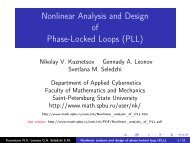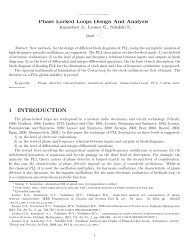Technical Sessions – Monday July 11
Technical Sessions – Monday July 11
Technical Sessions – Monday July 11
You also want an ePaper? Increase the reach of your titles
YUMPU automatically turns print PDFs into web optimized ePapers that Google loves.
2 - Stability of Network DEA<br />
Necmi Avkiran, UQ Business School, The University of<br />
Queensland, St Lucia Campus, 4072, Brisbane, Queensland,<br />
Australia, n.avkiran@uq.edu.au<br />
Users of network DEA (NDEA) presume efficiency estimates to be robust.<br />
Findings indicate (a) removing a relevant input improves discrimination (b)<br />
introducing an extraneous input leads to a moderate loss of discrimination (c)<br />
simultaneously adjusting data shows a mostly stable NDEA (d) swapping divisional<br />
weights produces a substantial drop in discrimination (e) stacking perturbations<br />
has the greatest impact on efficiency estimates with substantial loss<br />
of discrimination, and (f) layering suggests that the core inefficient cohort is<br />
resilient against omission of benchmark branches.<br />
3 - A Computational Analysis of the Impact of Correlation<br />
in DEA<br />
Francisco Lopez, School of Business, Macon State College, 100<br />
College Station, 31206, Macon, GA, United States,<br />
francisco.lopez@maconstate.edu, Johnny Ho, Alex Ruiz-Torres<br />
Two recent articles discuss especial types of linear relations (perfect correlation)<br />
among DEA attributes and how they may affect the DEA scores. These<br />
perfect correlations may have a very different impact on the DEA scores. In<br />
the case of one of these linear relations, removing one of the DEA attributes<br />
does not change the efficiency score of any DMU. The presence of another<br />
type of linear relation makes all the DMUs efficient. This research project aims<br />
at conducting an extensive computational analysis to understand the effect on<br />
the DEA efficiency scores of correlation among attributes.<br />
4 - A DEA Approach in Supplier Selection Taking into Account<br />
Transportation and Inventory costs<br />
Stella Sofianopoulou, Industrial Management & Technology,<br />
University of Piraeus, 80 Karaoli & Dimitriou street, 18534,<br />
Piraeus, Greece, sofianop@unipi.gr<br />
Most studies related to the supplier selection problem consider several selection<br />
criteria but little attention is given to transportation and inventory costs.<br />
In this paper, a two-phase approach for the supplier selection problem is proposed.<br />
First, the sum of transportation and inventory costs for each supplier<br />
is determined by employing genetic algorithms. Second, a DEA approach is<br />
adopted to evaluate performance of suppliers based on multiple criteria including<br />
transportation and inventory costs and at the same time suggest negotiation<br />
strategies for inefficient suppliers.<br />
� MB-19<br />
<strong>Monday</strong>, 14:00-15:30<br />
Meeting Room 216<br />
Projects & Cases - Getting Students<br />
Involved<br />
Stream: Education and Operations Research<br />
Invited session<br />
Chair: Susan Martonosi, Mathematics Dept., Harvey Mudd College,<br />
301 Platt Blvd., 917<strong>11</strong>, Claremont, CA, United States,<br />
martonosi@math.hmc.edu<br />
1 - A Case-Based Approach for Teaching Management Science<br />
and Project Management<br />
Bert De Reyck, Management Science & Operations, London<br />
Business School, Regent’s Park, NW1 4SA, London, United<br />
Kingdom, bdereyck@london.edu<br />
I will give an overview of how cases are used in my Project Management and<br />
Management Science courses at London Business School and University College<br />
London. In my opinion, the use of cases is essential for making a course<br />
interesting and relevant, but cases can be of different types, and used in different<br />
ways. I will describe how I develop and use cases in the classroom with<br />
MBA and MSc students, and contrast it with other approaches.<br />
2 - Experiences on Cooperative Learning in OR courses<br />
Marcela Gonzalez, Departamento de Modelación y Gestión<br />
Industrial, Universidad de Talca, Merced 437, s/n, Curicó,<br />
Región del Maule, Chile, mgonzalez@utalca.cl<br />
The experience acquired in the last three years on cooperative learning in OR<br />
courses is presented. Some cooperative learning methods applied for helping<br />
students to work in groups and to solve OR problems are shown.<br />
IFORS 20<strong>11</strong> - Melbourne MB-21<br />
3 - Senior Capstone Projects: A Taste of the Real World<br />
Susan Martonosi, Mathematics Dept., Harvey Mudd College,<br />
301 Platt Blvd., 917<strong>11</strong>, Claremont, CA, United States,<br />
martonosi@math.hmc.edu<br />
A senior capstone is a project conducted during a student’s final year, whose<br />
intention is to synthesize the material they have learned in their courses. At<br />
Harvey Mudd College, mathematics students can choose a traditional thesis<br />
project or a "clinic" project. Clinics are industry-sponsored projects in which<br />
a team of students works on a real-world problem of interest to the sponsoring<br />
organization. This talk will present an overview of the clinic model and discuss<br />
its educational benefits and shortcomings.<br />
� MB-20<br />
<strong>Monday</strong>, 14:00-15:30<br />
Meeting Room 217<br />
Soft OR II<br />
Stream: Soft OR and Problem Structuring<br />
Invited session<br />
Chair: Vicky Mabin, Victoria Management School, Victoria<br />
University of Wellington, PO Box 600, 6140, Wellington, New<br />
Zealand, vicky.mabin@vuw.ac.nz<br />
1 - PSM Approach: Some Applications<br />
Arabinda Tripathy, Vinod Gupta School of Management, Indian<br />
Institute of Technology, 721302, Kharagpur, West Bengal, India,<br />
tripathy44@rediffmail.com<br />
Problem Structuring Methods approach has been applied in various situations<br />
to address complex societal problems and such other issues and to manage<br />
them. Some of the areas where the concepts of problem structuring methods<br />
have been used are presented here. These relate to issues related to elected representatives,<br />
workers, performance management of academic institutes and the<br />
like. The approach and the outcomes are presented.<br />
2 - Improving Service Delivery in a UK Police Force: Designing<br />
Control Processes using VSM and SSM<br />
Chris Smith, OIM Group, Aston University, Aston Business<br />
School, Aston Triangle, B4 7ET, Birmingham, West Midlands,<br />
United Kingdom, smithcm2@aston.ac.uk<br />
This presentation describes use of Viable System Modeling (VSM) and Soft<br />
Systems Methodology (SSM) to develop a control process for a new customer<br />
contact strategy in a UK police force. Spending cuts in the UK are driving<br />
a UK Police Force to restructure their customer contact, moving away from a<br />
costly front office network to partnering with local councils in One Stop Shops.<br />
Through using VSM and SSM to design the control processes for a new system<br />
a control process has been designed that is both viable while taking into<br />
account the different perspectives of actors who work within the system.<br />
3 - Elder Care Decisions: A Multi-methodological Approach<br />
Vicky Mabin, Victoria Management School, Victoria University<br />
of Wellington, PO Box 600, 6140, Wellington, New Zealand,<br />
vicky.mabin@vuw.ac.nz, Kim Sommer, Gemma Clark<br />
The need for families to confront decisions relating to care of the elderly<br />
are becoming increasingly common with the aging population. This paper<br />
will draw on two different real-life cases, and demonstrate how different approaches<br />
taken from Soft Systems Methodology, Theory of Constraints and<br />
Multi-criteria decision making can be used in multi-methodological fashion<br />
tackle the many facets of how best to care for one’s elder folk. Each method is<br />
able to complement the other to provide a more complete view.<br />
� MB-21<br />
<strong>Monday</strong>, 14:00-15:30<br />
Meeting Room 218<br />
OR in Forestry<br />
Stream: Forestry Applications<br />
Invited session<br />
Chair: Andrés Weintraub, University of Chile, Santiago, Chile,<br />
aweintra@dii.uchile.cl<br />
19




